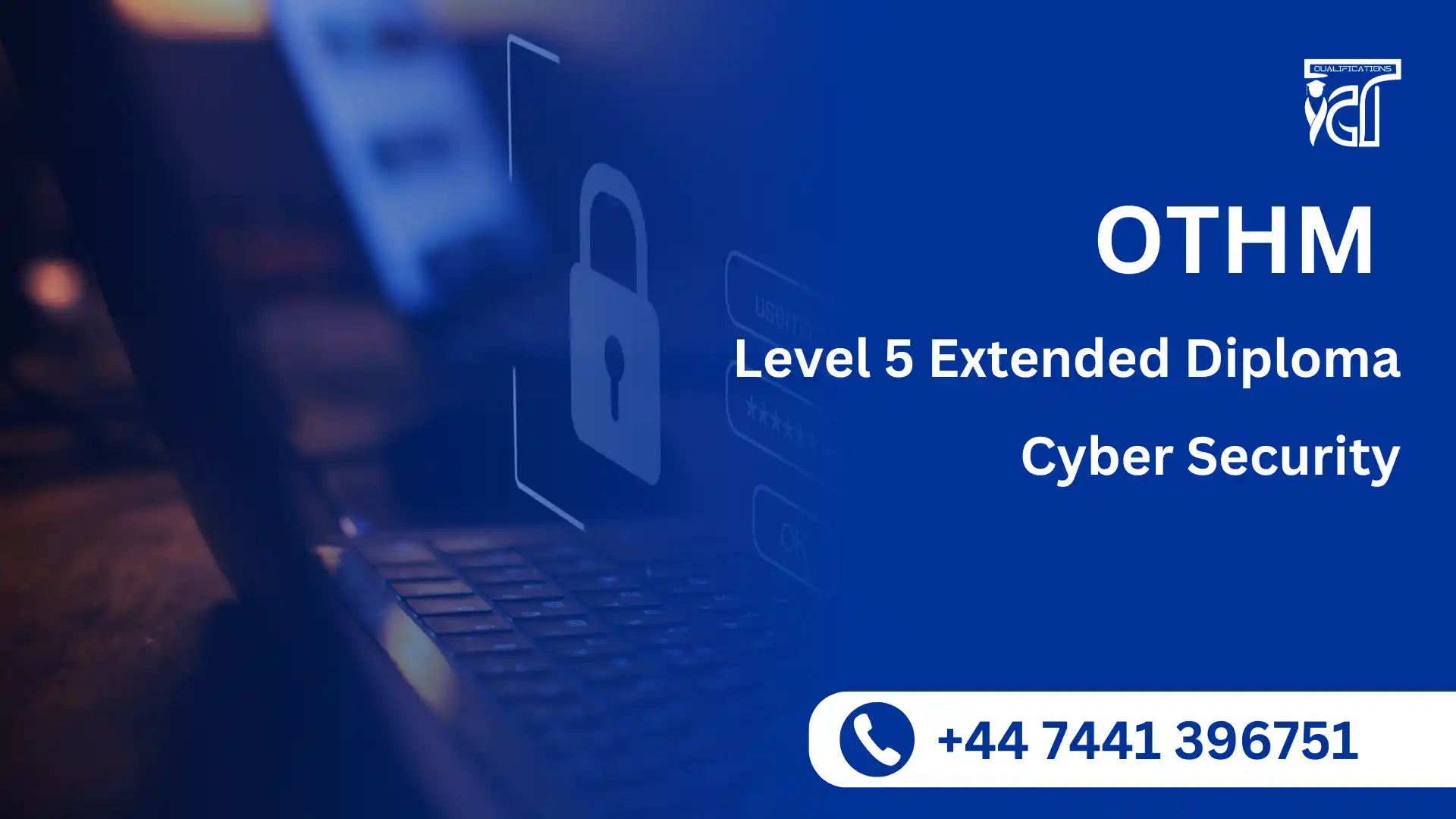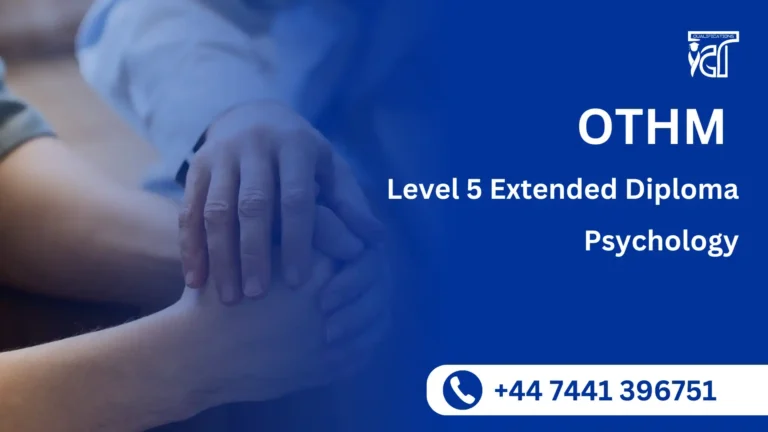In today’s digital world, the need for robust cybersecurity measures is more critical than ever. With cyber threats becoming increasingly sophisticated, there is a growing demand for skilled professionals to safeguard sensitive data and secure systems. The OTHM Level 5 Extended Diploma in Cyber Security offers a comprehensive, Ofqual-regulated qualification designed to equip learners with the knowledge and practical skills required to thrive in this rapidly evolving field. This qualification is entirely assignment-based, allowing students to learn at their own pace while gaining valuable expertise.
The OTHM Level 5 Extended Diploma in Cyber Security is a high-level qualification designed to provide in-depth knowledge of the key principles and practices of cyber security. This Ofqual-regulated qualification is equivalent to the second year of a UK undergraduate degree, making it an ideal option for those looking to advance their skills or further their career in the cyber security industry.
The OTHM Level 5 Extended Diploma in Cyber Security is an excellent qualification for individuals looking to advance their career in the ever-growing field of cyber security. With its Ofqual regulation, flexible assignment-based learning, and comprehensive curriculum, this course offers an ideal path for aspiring cyber security professionals and those looking to specialize in the field.
OTHM Level 5 Extended Diploma in Cyber Security
The OTHM Level 5 Extended Diploma in Cyber Security consists of 12 mandatory units, totaling 240 credits. The qualification requires 2400 hours of Total Qualification Time (TQT), with a recommended minimum of 1200 Guided Learning Hours (GLH).
Level 4 Mandatory units:
| Sr# | Unit Title | Credits | GLH |
|---|---|---|---|
| 1 | Information Technology Security | 20 | 100 |
| 2 | Principles of Computer Science | 20 | 100 |
| 3 | Algorithms and Data Structures | 20 | 100 |
| 4 | Computer Networks | 20 | 100 |
| 5 | Mathematics for Computer Science | 20 | 100 |
| 6 | Operating Systems | 20 | 100 |
| 7 | Security Testing | 20 | 100 |
| 8 | Artificial Intelligence | 20 | 100 |
| 9 | Databases | 20 | 100 |
| 1 | Digital Forensics | 20 | 100 |
| 11 | Ethical Hacking | 20 | 100 |
| 12 | Malware Analysis | 20 | 100 |
GLH (Guided Learning Hours) and TQT (Total Qualification Time) are terms commonly used in vocational qualifications to help define the amount of time a learner is expected to spend on heir studies.
1. GLH (Guided Learning Hours)
GLH refers to the number of hours a learner spends being directly taught, supervised, or supported during their course. This includes the time spent in activities such as:
- Classroom instruction
- Practical workshops
- One-on-one tutoring or mentoring sessions
- Online learning sessions with tutor support
In other words, GLH represents the time that learners are actively engaged with their instructors or learning activities.
2. TQT (Total Qualification Time)
TQT represents the total amount of time a learner is expected to invest in completing a qualification, including:
- GLH (Guided Learning Hours): Time spent on direct learning, as explained above.
- Self-Directed Learning: This includes time spent on independent study, research, assignment completion, preparation for exams, and any other work the learner does outside of direct teaching hours.
TQT is a broader measure that includes all the time required to achieve the qualification. It helps learners and employers understand the overall commitment required for the qualification.
Key Differences Between GLH and TQT:
- GLH focuses on direct learning with guidance or supervision.
- TQT includes GLH as well as independent study time and other learning-related activities.
Example:
If a qualification has a TQT of 600 hours and a GLH of 250 hours, it means the learner should spend 250 hours in direct learning (classroom, online, or tutor-led sessions) and 350 hours on independent study or research.
Learning Outcomes of OTHM Level 5 Extended Diploma in Cyber Security
Information Technology Security
- Understand the nature of information and what is meant by information privacy.
- Understand key concepts in information security, including threats and risks.
- Understand the importance of secure design in Cyber Security systems.
- Be able to apply cryptographic techniques to encrypt and decrypt information.
- Understand legal and societal issues concerning information security.
Principles of Computer Systems
- Understand the architecture and key components of computer systems.
- Understand the types and functions of memory in computing systems
- Be able to design and implement simple state machines.
- Understand the fundamentals of logic circuits and gates.
- Understand the fundamentals of assembly language and how it relates to higher level programming languages.
Algorithms and Data Structures
- Understand a range of essential data structures
- Understand algorithmic complexity and appreciate its importance.
- Understand a range of algorithmic techniques.
- Be able to write algorithms in popular programming languages
Computer Networks
- Understand the core principles of computer networks.
- Understand how devices connect to form networks
- Be able to design a computer network suited to a given setting.
Mathematics for Computer Science
- Understand binary and the representation of numbers in different bases.
- Understand the principles of propositional logic, set theory, and proof as applicable to computer science.]
- Understand key topics in number theory and their application in computer science.
- Understand series and sequences and their importance in computer science.
- Understand key topics in linear algebra.
Operating Systems
- Understand the essential function and architecture of modern operating systems.
- . Understand memory and I/O management techniques used by modern operating systems.
- Understand process management techniques used by modern operating systems.
- Understand the principles of and potential problems with concurrency in operating systems.
- Understand the principles of and potential problems with concurrency in operating systems.
Security Testing
- Understand a range of security testing methods.
- Be able to perform essential mobile application security testing.
- Understand the ethical and professional standards in security testing
- Understand the ethical and professional standards in security testing
Artificial Intelligence
- Understand the principles of artificial intelligence and data-driven learning.
- Understand the principles underlying neural network training.
- Be able to build and train neural networks.
- Understand a range of generative modelling architectures and techniques in deep learning.
- Understand how AI can be used for both offence and defence in the realm of Cyber Security.
Databases
- Understand the fundamental concepts of databases
- Be able to design a relational database based on user specifications.
- Be able to use SQL to interact with databases.
Digital Forensics
- Understand the principles of digital forensics
- Understand the key techniques used in digital forensic investigations
- Be able to conduct forensic analysis of computer systems and storage media.
- Be able to use digital forensic techniques to verify the source and authenticity of image and video data.
- Understand the legal and ethical aspects of digital forensics
Ethical Hacking
- Understand the role of penetration testing in enhancing Cyber Security.
- Be able to identify and assess security vulnerabilities through reconnaissance, scanning and vulnerability assessment
- Be able to exploit security vulnerabilities and report findings to help mitigate and prevent security attacks.
- Understand the legal and ethical considerations for penetration testing.
Malware Analysis
- Understand the different types of malware that exist and how they spread.
- . Understand how to detect malware and describe the challenges of doing so.
- Be able to perform malware analysis to identify and understand the function of malware
- Understand strategies to protect from malware and recover from attacks.
The OTHM Level 5 Extended Diploma in Cyber Security provides a range of advantages for those looking to build or enhance their careers in the fast-growing field of cybersecurity. Here are the key benefits of pursuing this qualification:
1. Comprehensive Skill Development
The qualification covers a broad spectrum of essential cybersecurity topics, including risk management, cryptography, incident response, and security policies. It equips learners with the knowledge and practical skills needed to manage and mitigate cyber threats, making them valuable assets in any organization’s cybersecurity strategy.
2. Ofqual Regulated and Recognized
As an Ofqual-regulated qualification, the OTHM Level 5 Extended Diploma in Cyber Security meets high academic and professional standards. This ensures that the qualification is recognized by employers and academic institutions, enhancing your credibility in the cybersecurity field.
3. Assignment-Based Assessment
The qualification is entirely assessed through assignments, providing a more practical and applied learning experience. Learners can focus on understanding and solving real-world cybersecurity issues, rather than relying on traditional exams. This method fosters deeper learning and allows students to demonstrate their skills in more meaningful ways.
4. Flexible Learning
The OTHM Level 5 Extended Diploma offers flexible study options, making it suitable for individuals with work or personal commitments. The course allows learners to study at their own pace, balancing education with their professional or personal responsibilities. This flexibility makes it an ideal choice for working professionals.
5. Pathway to Further Education
Upon completing the OTHM Level 5 Extended Diploma, learners can progress to higher-level qualifications, including a Master’s degree in Cyber Security or other specialized postgraduate courses. This qualification serves as an excellent foundation for further academic and professional growth in the field of cybersecurity.
6. Enhanced Career Prospects
The demand for cybersecurity professionals is growing rapidly, with organizations across industries looking for skilled individuals to protect their data and systems. The OTHM Level 5 Extended Diploma in Cyber Security prepares graduates for roles such as cybersecurity analyst, network security engineer, ethical hacker, and more, significantly improving career opportunities.
7. Global Recognition
This qualification is globally recognized by employers and academic institutions, giving graduates the flexibility to pursue career opportunities and further studies both in the UK and internationally. The global recognition enhances the value of the qualification and opens up a wider range of opportunities.
8. Industry-Relevant Curriculum
The curriculum is designed to address current and emerging cybersecurity challenges, ensuring that learners are equipped with the skills and knowledge needed to address real-world issues. Topics such as risk management, data protection, and network security are essential for today’s cybersecurity professionals, and the qualification focuses on these key areas.
9. Improved Employability
Graduates of the OTHM Level 5 Extended Diploma in Cyber Security will have the practical skills and theoretical knowledge to excel in the competitive cybersecurity job market. The qualification gives employers confidence that graduates are well-prepared to handle complex security challenges in a rapidly changing digital landscape.
10. Develop Critical Thinking and Problem-Solving Skills
The assignment-based structure of the course allows learners to engage in problem-solving and critical thinking, essential skills for cybersecurity professionals. By working on practical assignments, students develop the ability to assess, analyze, and respond to complex security issues.
The OTHM Level 5 Extended Diploma in Cyber Security is designed for individuals who are eager to develop their expertise in protecting digital systems and data from evolving cyber threats. Below is a breakdown of the ideal learner for this qualification:
1. Aspiring Cybersecurity Professionals
The ideal learner is someone who is looking to start a career in cybersecurity and aims to develop a solid foundation in information security, risk management, network protection, and ethical hacking. This qualification provides the knowledge and practical skills necessary to secure digital systems and tackle emerging cyber threats effectively.
2. IT Professionals Seeking Specialization
For current IT professionals who wish to specialize in cybersecurity, this qualification offers an excellent opportunity to broaden their skill set. Whether you’re already working as a network administrator, system engineer, or IT support professional, the OTHM Level 5 Extended Diploma allows you to enhance your expertise in cybersecurity and advance in your career.
3. Individuals with a Technical Background
Learners with a background in computer science, information technology, or related fields will benefit greatly from this qualification. A strong understanding of IT systems and network infrastructure can be advantageous, as this course delves into advanced cybersecurity topics that require a technical mindset.
4. Career Changers Interested in Cybersecurity
The course is also suitable for individuals from other fields who are looking to transition into the fast-growing cybersecurity industry. If you have a keen interest in technology and want to build a new career protecting organizations from cyber threats, this diploma can help you gain the specialized knowledge needed for the role.
5. Current Cybersecurity Professionals Seeking Formal Accreditation
If you are already working in a cybersecurity-related role, such as a cybersecurity analyst or information security officer, but lack formal qualifications, this diploma offers an opportunity to validate and enhance your skills. The course helps professionals formalize their experience and knowledge while equipping them with a deeper understanding of cybersecurity strategies.
6. Self-Motivated Learners
The ideal learner for the OTHM Level 5 Extended Diploma in Cyber Security is someone who is self-disciplined, motivated, and able to manage their own learning. Since the qualification is entirely assignment-based and offers flexible study hours, students should be comfortable working independently and managing their time effectively to meet deadlines.
7. Individuals Seeking Career Advancement
Whether you are currently working in IT or cybersecurity and are looking to move into senior roles, this qualification is ideal for individuals seeking career progression. The knowledge and credentials gained from the diploma open doors to higher positions such as cybersecurity manager, risk analyst, or network security consultant.
8. Learners Interested in Continuous Learning
Cybersecurity is a rapidly evolving field, and the ideal learner is someone who is committed to staying updated with new technologies and emerging threats. This course provides a comprehensive foundation in cybersecurity, and learners with a passion for continuous learning and adapting to new challenges will thrive in the ever-changing cybersecurity landscape.
Entry Requirements
Register Now
Qualification Process
Qualification Process OTHM Level 5 Extended Diploma in Cyber Security
- Self-Assessment:
Begin by evaluating your eligibility to ensure you meet the qualification requirements, including work experience, knowledge, and language proficiency. - Registration:
Complete your registration by submitting the required documents, including a scanned copy of a valid ID, and paying the registration fee. - Induction:
An assessor will conduct an induction to confirm your eligibility for the course and explain the evidence requirements. If you do not meet the criteria, your registration will be canceled, and the fee will be refunded. - Assignments & Evidence Submission:
Provide all assignments and the necessary evidence based on the assessment criteria outlined in the course. If you are unsure of the required evidence, consult with the assessor for guidance on the type and nature of evidence needed. - Feedback and Revision:
The assessor will review your submitted evidence and provide feedback. Evidence that meets the criteria will be marked as “Criteria Met,” while any gaps will be identified. You will be asked to revise and resubmit if needed. - Competence Evidence:
Submit final evidence demonstrating that all learning outcomes have been met. This evidence will be marked as “Criteria Met” by the assessor once it is satisfactory. - Internal Quality Assurance (IQA):
The Internal Quality Assurance Verifier (IQA) will review your evidence to ensure consistency, quality, and compliance with standards. - External Verification:
The IQA will submit your portfolio to OTHM External Quality Assurance Versifier (EQA) for final confirmation. The EQA may contact you directly to verify the authenticity of your evidence. - Certification:
Upon successful completion of all checks, OTHM will issue your official certificate, confirming that you have attained the OTHM Level 5 Extended Diploma in Cyber Security







